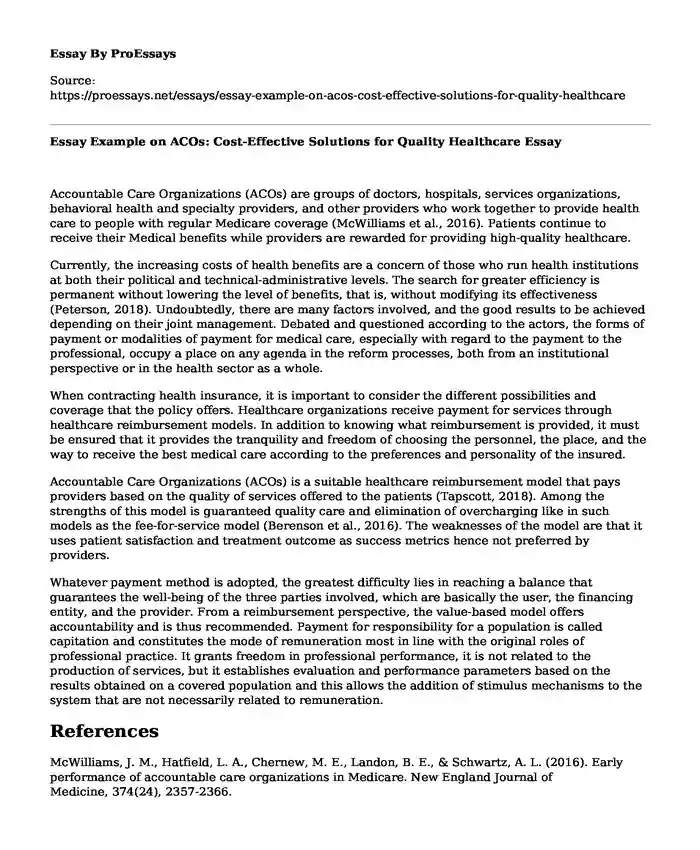Accountable Care Organizations (ACOs) are groups of doctors, hospitals, services organizations, behavioral health and specialty providers, and other providers who work together to provide health care to people with regular Medicare coverage (McWilliams et al., 2016). Patients continue to receive their Medical benefits while providers are rewarded for providing high-quality healthcare.
Currently, the increasing costs of health benefits are a concern of those who run health institutions at both their political and technical-administrative levels. The search for greater efficiency is permanent without lowering the level of benefits, that is, without modifying its effectiveness (Peterson, 2018). Undoubtedly, there are many factors involved, and the good results to be achieved depending on their joint management. Debated and questioned according to the actors, the forms of payment or modalities of payment for medical care, especially with regard to the payment to the professional, occupy a place on any agenda in the reform processes, both from an institutional perspective or in the health sector as a whole.
When contracting health insurance, it is important to consider the different possibilities and coverage that the policy offers. Healthcare organizations receive payment for services through healthcare reimbursement models. In addition to knowing what reimbursement is provided, it must be ensured that it provides the tranquility and freedom of choosing the personnel, the place, and the way to receive the best medical care according to the preferences and personality of the insured.
Accountable Care Organizations (ACOs) is a suitable healthcare reimbursement model that pays providers based on the quality of services offered to the patients (Tapscott, 2018). Among the strengths of this model is guaranteed quality care and elimination of overcharging like in such models as the fee-for-service model (Berenson et al., 2016). The weaknesses of the model are that it uses patient satisfaction and treatment outcome as success metrics hence not preferred by providers.
Whatever payment method is adopted, the greatest difficulty lies in reaching a balance that guarantees the well-being of the three parties involved, which are basically the user, the financing entity, and the provider. From a reimbursement perspective, the value-based model offers accountability and is thus recommended. Payment for responsibility for a population is called capitation and constitutes the mode of remuneration most in line with the original roles of professional practice. It grants freedom in professional performance, it is not related to the production of services, but it establishes evaluation and performance parameters based on the results obtained on a covered population and this allows the addition of stimulus mechanisms to the system that are not necessarily related to remuneration.
References
McWilliams, J. M., Hatfield, L. A., Chernew, M. E., Landon, B. E., & Schwartz, A. L. (2016). Early performance of accountable care organizations in Medicare. New England Journal of Medicine, 374(24), 2357-2366.
Tapscott, A. (2018). Value Based Healthcare: The Missing Formula for Quality Patient Care.
Peterson, S. K. (2018). Changing the healthcare organization: the strategic framework to shift from fee-for-service reimbursements to value-based reimbursement methods.
Berenson, R. A., Burton, R. A., & McGrath, M. (2016, September). Do accountable care organizations (ACOs) help or hinder primary care physicians' ability to deliver high-quality care?. In Healthcare (Vol. 4, No. 3, pp. 155-159). Elsevier.
Cite this page
Essay Example on ACOs: Cost-Effective Solutions for Quality Healthcare. (2023, Sep 25). Retrieved from https://proessays.net/essays/essay-example-on-acos-cost-effective-solutions-for-quality-healthcare
If you are the original author of this essay and no longer wish to have it published on the ProEssays website, please click below to request its removal:
- Health Care Crisis in America
- Diamond Foods Inc. Paper Example
- Essay on Health Benefits of Organic Food and Counter Argument
- Case Studies of Patients With Kidney Diseases
- Student's Well Being Quantitative Study Paper Example
- Free Essay Example on Addressing Nursing Shortage: Educational Background, Expertise
- Learning Disability - Essay Example







